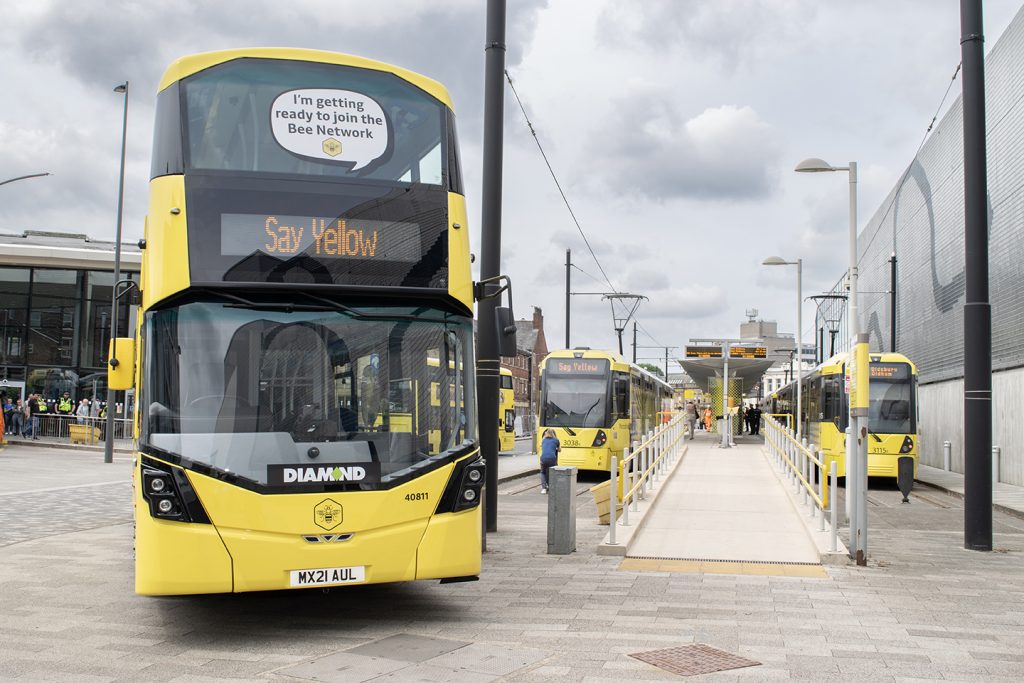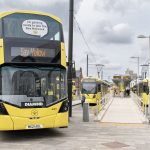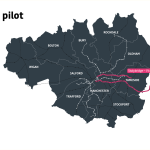 The Mayor of Greater Manchester Andy Burnham has confirmed the decision of Transport for Greater Manchester (TfGM) to create a single bus and tram ticketing system to cut cost of travel. The proposed route for the contactless pilot on rail in Greater Manchester is subject to final business case approval and funding.
The Mayor of Greater Manchester Andy Burnham has confirmed the decision of Transport for Greater Manchester (TfGM) to create a single bus and tram ticketing system to cut cost of travel. The proposed route for the contactless pilot on rail in Greater Manchester is subject to final business case approval and funding.
First announced as part of the city-region’s trailblazer devolution deal, TfGM has been working closely with Great British Railways Transition Team (GBRTT) and the Department for Transport (DfT) to develop the pilot on services between Stalybridge and Victoria, and Glossop and Piccadilly.
The three institutions will then work together to use the pilot to support the wider ambition of full multi-modal integration into the Bee Network across bus, Metrolink, rail and cycle hire, including fares simplification and capping, by 2030.
Following this decision, a pilot contactless touch-in/touch-out project will be launched which will make Greater Manchester the first area outside London to implement such a project.
“Cutting the cost of public transport benefits everyone and I want it to be a lasting and defining part of the Bee Network. That can only happen if more people use it, so my plea today is for everyone to get on board with us and help keep fares low,” Andy Burnham said, adding that the pilot project is a new way to pay rail journeys “that will ultimately enable us to integrate certain key rail services in Greater Manchester into the Bee Network.”
As part of the Bee Network, Greater Manchester is bringing buses back under local control in three phases, starting in Wigan, Bolton and parts of Salford and Bury, with services to be operated by Go North West and Diamond from 24 September 2023.
The second phase of franchising will take place in Rochdale, Oldham, Bury and parts of Manchester, Salford and Tameside from 24 March, with Stagecoach, First and Diamond announced as the operators appointed to run these services. As well as prioritising performance and reliability, bringing buses under local control is proving more efficient and effective than the current deregulated market, with franchised services costing less than those recently funded by TfGM after they were withdrawn by operators.
The new Bee AnyBus + Tram tickets, delivered by TfGM with support from Greater Manchester TravelCards Ltd (GMTL), will make combined bus and tram ticketing system will reduce travel costs by around 20 percent cheaper compared to buying products separately and will launch on 24 September when the city-region becomes the first area to begin to bring buses under local control for the first time in almost 40 years.
Integrating fares across different modes is key to enabling seamless journeys. Following the launch of the new Bee AnyBus + Tram tickets, TfGM will be working towards a touch-in/touch-out contactless system that will cap travel made across bus and tram, to be launched in early 2025 in line with the final phase of bus franchising.
Bought through the new Bee Network app and other retail channels, it means unlimited journeys on any bus service and any chosen Metrolink zone for as little as GBP 5.40 (EUR 6.3). Unlimited travel on all buses and the entire Metrolink network will cost GBP 7.80 (EUR 99.1) if travelling off-peak, or GBP 9.50 (EUR 11.1) at peak times. In comparison, the average cost of just parking a car in Manchester city centre is GBP 7 (EUR 8.2) for two hours and GBP 10.27 (EUR 12) for three hours.
The move follows the introduction of daily capped bus fares last September, brought in a year earlier than planned to help with the cost of living, that are now being extended for at least another year, until September 2024. The fares, capped at GBP 2 for single journeys (GBP 1 for children) and GBP 5 for an AnyBus all day travelcard (GBP 2.50 for children), have proved hugely popular with customers and have contributed to an estimated 12% increase in bus trips.
The decision to a simplified, integrated and cheaper fare structure is a key part of the Bee Network, Greater Manchester’s plan for a ‘London-style’, high volume, low fare, transport system, which will transform the way people travel across the city region.
Share on:






